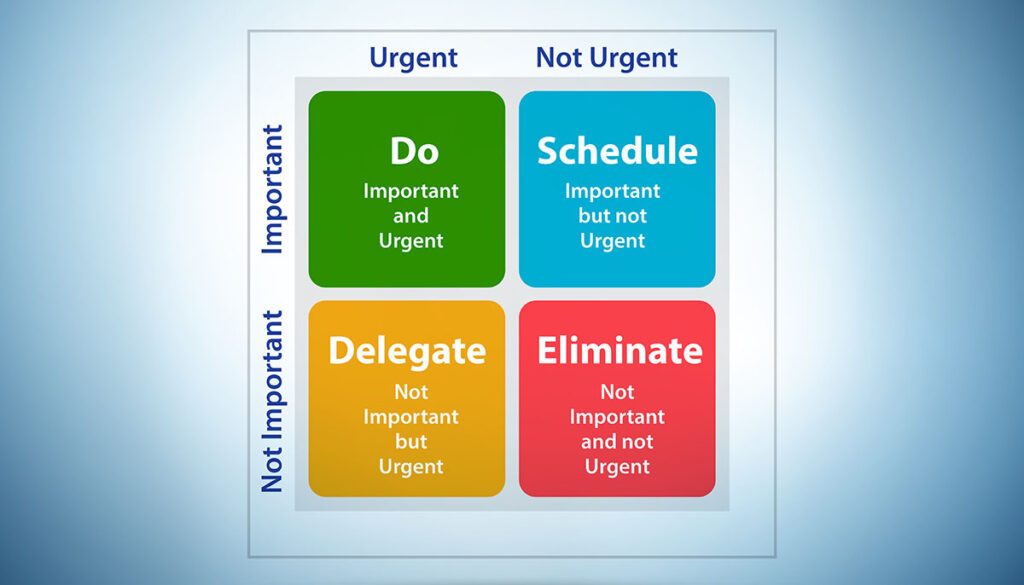Tell me, what is it you plan to do with your one wild and precious life?
Mary Oliver, “The Summer Day”
Each of us gets 168 hours every week, so why do some people seem to achieve so much more than the rest of us? They’re not necessarily better at time management. However, I can guarantee they’re better at priority management. And no, those aren’t the same thing.
If you stay busy all the time but never seem to get anything done, then grab a pencil and a piece of paper. I’m about to change your life.
The Eisenhower Matrix
The Eisenhower Matrix, also called the Eisenhower Box or the Decision Matrix, is named after the 34th President of the United States, Dwight. D. Eisenhower. During World War II, Eisenhower was promoted to the rank of five-star General of the Army and became Supreme Commander of the Allied Expeditionary Force in Europe. After he helped lead the Allied troops to victory on D-Day, he led the United States through the Korean War and the start of the Cold War with Russia.
In other words, Eisenhower crossed a historically significant number of items off his to-do. So how can you be more like Ike—at least in terms of getting stuff done?

Dividing the urgent from the important was Eisenhower’s key to achieving so much in his lifetime. Later, Stephen Covey of The 7 Habits of Highly Effective People took Eisenhower’s advice a step further and created a visual tool to organize priorities.
The Eisenhower Matrix is a simple grid. On your paper, draw a large square. Then divide it into four smaller squares. In each numbered quadrant, you’ll group tasks according to how urgent and important they are:
- Urgent and Important
- Not Urgent but Important
- Urgent and Not Important
- Not Urgent and Not Important
Sounds simple, right? Maybe even too simple. But once you learn to use the matrix, you’ll realize it’s actually genius.
Urgent vs. Important: What’s the Difference?
Eisenhower believed that we needed to use our time and energy effectively, not just efficiently. The point isn’t to accomplish as many tasks as possible in a day, but to focus on the most vital work of our lives.
It’s all too easy to chase after urgent tasks all day and put off the long-term moves needed to make your dreams a reality. The thing about urgent tasks is that they never…stop…coming. No matter how hard you try to keep up, you’ll eventually end up like Lucy at the chocolate factory.

Worst of all, many of those urgent tasks aren’t even important! At work and at home, urgent tasks are often tied to other people’s goals—not your own.
What If You Don’t Know What’s Important?
If you’re struggling to decide if a task is important, you might need to take another step back and think about your priorities. When you’ve been living on autopilot for a while, you can lose sight of what’s important to you. Are you using your one wild and precious life to live authentically and in harmony with your core values? What are your core values?
Those questions can only be answered through self-reflection. Carve out time without a flock of urgent tasks pulling on your attention. Use it to think about the things that bring you the greatest joy and satisfaction. Journaling can be really helpful here. Try these prompts to help clarify your values and priorities:
- In ten years from now, what will I be proud of achieving?
- Write down three to five activities that make you feel grounded, happy, and most like yourself. For example, doing yoga, spending time with family, gardening, doing charity work, etc.
- Consider a person you admire. What are three things about them that inspire you?
- Write the words “I am __________________” five times in your journal. Then fill in the blanks.
It’s not uncommon to discover that the way you spend your time has little to do with your core values. Don’t beat yourself up if that’s the case! It just means that you need to shift your priorities.
Read More: Why You Should Pick Up a Journaling Practice
How to Tackle Every Quadrant of the Matrix
Now that you understand the principle, it’s time to put it into action! I would recommend starting with either work or home management, but not both. Crossing the personal and professional streams can make it harder to figure out whether something is important. For the rest of this post, we’ll talk about home tasks since they’re a little more universal.
Quadrant #1: Urgent and Important
These tasks have a pressing deadline and will cause problems if you fail to do them. Luckily, they’re also usually “low-hanging fruit.” You can grab a task from this list and knock it out fast.

Depending on the flow of your daily energy and your structured schedule, you may find it easiest to do these tasks first thing in the morning. However, they may also pop up throughout the day. Stay flexible, but also guard your time like the treasure it is. People love to make their problems into your priorities, after all.
Examples of things that belong in this box are paying bills, washing dishes, doing laundry, finishing homework, cooking a healthy dinner. The consequences for failing to do these tasks on time are clear-cut, but they don’t actually take that much effort to complete.
Quadrant #2: Not Urgent but Important
This is the good stuff. The work that will help you achieve your biggest goals and achieve your wildest dreams. It also tends to be the stuff that gets pushed aside in favor of more urgent—but usually less important—tasks.
Human beings are bad at telling the difference between urgent and important tasks. We’re inclined to tackle the most urgent things first even when other tasks offer us more satisfaction and even financial rewards. You can check out the scientific research that backs up this “Mere-Urgency Effect” by requesting a PDF—just don’t do that instead of more important work, okay?
In order to achieve your big ol’ dreams, you need to schedule time to work on them without distractions. Drop those blocks on your calendar and hold yourself accountable for using the time wisely.

Examples of things that belong in this quadrant are exercising, practicing music or learning a craft, planning meals for the week, connecting with loved ones, home renovation projects, and so on. If you don’t meet your self-assigned deadlines on these goals, there won’t be any immediate consequences. However, you may find yourself feeling burned out, unmotivated, and frustrated if you keep pushing the really important stuff to the side.
Quadrant #3: Urgent but Not Important
Most of us spend way too much time churning through tasks in this quadrant. When something is urgent, our instinct is to make it go away as quickly as possible. That’s especially true when it arrives via an email notification, a phone call, or a text message.
The first step to reclaiming your time is to minimize distractions. Putting your phone on silent or pausing notifications during your “focus time” is a good start. You can also let your loved ones know that you’re going to be unavailable for a block of time to work on more important things. Check your email and social media at set times each day rather than reacting to notifications.

Read More: Setting Healthy Boundaries Isn’t a Luxury–It’s Essential
If at all possible, delegate these tasks. That might mean paying extra to have your groceries delivered or sending your laundry out. It could also mean getting the other members of your household to share chores more fairly. You could even hire a virtual personal assistant to help you manage all those little adulting tasks that can fall through the cracks.
Quadrant #4: Not Urgent and Not Important
Good news: You can safely ignore anything that ends up in this quadrant. These pesky little to-do items might be stowaways from other people’s values. Those people might be family or friends, or they might be society at large. Either way, check in with your core values before you agree to do something that is neither urgent nor important. Saying no is underrated!

In slightly less good news, you may also have to cut back on some of your favorite time-wasting activities to free up space for more important work. Scrolling through social media and watching TV can both become productivity black holes. If you don’t want to totally delete your accounts, consider checking social media twice a day for no more than thirty minutes total. As for TV, choose shows that can be enjoyed in the background while you tackle simple tasks or wait to indulge in your favorite show until after you’ve cleared the board.













